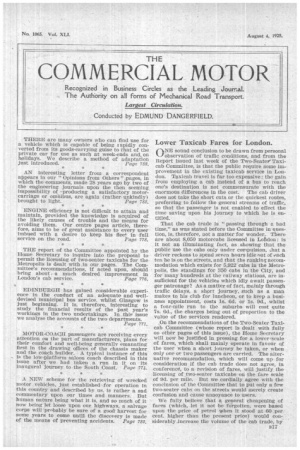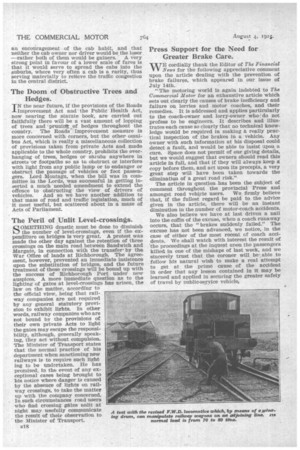Lower Taxicab Fares for London.
Page 1

Page 2

If you've noticed an error in this article please click here to report it so we can fix it.
(INE sound conclusion to be drawn from personal k-fobservation of traffic conditions, and from the Report issued last week of the Two-Seateie Taxicab Committee, is that the public require some improvement in the existing taxicab service in London. Taxicab travel is far too expensive: the gain from employing a cab instead of a bus to reach one's destination is not commensurate with the enormous differences in the cost. The cab driver does not take the short cuts or the quickest routes, preferring to follow the general streams of traffic, so that the passenger is not enabled to effect the time saving upon his journey to which he is entitled.
That the cab trade is "passing through a bad time," as was stated before the Committee in question, is, therefore, not a matter for wonder. There are about 8,050 motorcabs licensed in Lotidon : is it not an illuminating fact, as showing that the public use the cabs only under compulsion, i.bat driver reckons to spend seven hours idle out of each ten he is on the streets, and that the ranking accommodation which exists for 5,922 cabs in the Metropolis, the standings for 350 cabs in the City, and for many hundreds at the railway stations, are insufficient for the vehicles which idly await passenger patronage? As a matter of fact, mainly through traffic delays, a shert journey, such as a man makes to his club for luncheon, or to keep a business appointment, costs is. 6d. or is. 9d., whilst a four-mile run to the suburbs will cost quite 7s. 6d., the charges being out of proportion to the value of the services rendered.
On the recommendations of the Two-Seater Taxi cab Committee (whose report is dealt with fully on other pages of this issue), the Home Secrete ry will now be justified in pressing for a lower ,scale of fares, which shall mainly operate in favour of the user when a short journey be taken, or when only one or two passengers are carried. The alternative recommendation, which will come up for consideration if the cab trade does not agree, in conferencO, to a revision of fares, will justify the licensing of two-seater taxicabs on the fare scale of 9d. per mile. But we _cordially agree with the conclusion of the Committee that to put only a few two-seater cabson the streets would merely create confusion and cause annoyance to users.
We fully believe that a general cheapening of fares (which, let it not be fOrgotten, were based upon the price of petrol when it stood at 60 per cent. higher than the present price) would considerably increase the volume of the cab trade, by an encouragement of the cab habit, and that neither the cab owner nor driver would be the loser —rather both of them would be gainers. A very strong point in favour of a lower scale of fares is that it would serve to spread the cabs into the suburbs, where very often a cab is a rarity, thus serving materially to relieve the traffic congestion in the central district.
The Doom of Obstructive Trees and Hedges.
TN the near future, if the provisions of the Roads -I-Improvement Act and the Public Health Act, now nearing the statute book, are carried out faithfully there will be a vast amount of lopping of trees and ,prunint _of hedges throughout the country. The RoadsImprovement measure is more concerned with corners, but the otheromnibus Act, which is really a miscellaneous collection of provisions taken from private Acts and made applicable to the whole country, prohibits the overhanging of trees, hedges or shrubs anywhere in streets or footpaths so as to obstruct or interfere with light from any public lamp or to endanger or obstruct the passage of vehicles or foot passengers. Lord Montagu, when the bill was in committee in the Lords, was successful in getting inserted a much needed amendment to extend the offence to obstructing the view of drivers of vehicles. And so we have another addition to that mass of road and traffic legislation, much of it most useful, but scattered about in a maze of Acts of Parliament.
The Peril of _Unlit Level-crossings.
OMETHING drastic must be done to diminish 10 the number of level-crossings, even if the expenditure on bridges is very great. A protest was made the other day against the retention of three crossings on the main road between Sandwich and Margate, in connection with the transfer' by the War Office of lands at Richborough. The agreement, however, prevented an immediate insistence upon the substitution of bridges, and the future treatment of these crossings will be bound up with the success of Richborough Port under new auspices. A more immediate question as to the lighting of gates at level-crossings has arisen, the law on the matter, according to the official view, being that railway companies are not required by any general statutory provision to exhibit lights. In other words, railway companies who are not bound by the provisions of their own private Acts to light the gates may escape the responsibility, although, generally speaking, they act without compulsion. The Minister of Transport states that the normal practice of his department when sanctioning new railways is to require such light ing to be undertaken. He has promised, in the event of any exceptional cases being brought to his notice where danger is caused by the absence of lights on railway crossings, to take the matter up with the company concerned. In such circumstances road users who find crossing gates unlit at night may usefully communicate the result of their observation to the Minister of Transport.
B18
Press Support for the Need for Greater Brake Care.
w"E cordially thank the Editor of The Financial News for the following appreciative comment upon the article dealing with the prevention of brake failures, which appeared in our issue of July 14th.
"The motoring world is again indebted to The Commercial Motor for an exhaustive article which sets out clearly the causes of brake inefficiency and failure on lorries and motor coaches, and their remedies. It is addressed and applies particularly to the coach-owner and lorry-owner who do not profess to be engineers. It describes and illustrates each cause so clearly that no technical knowledge would be required in making a really practical inspection of the brakes in a vehicle. Any owner with such information at his disposal could detect a fault, and would be able to insist upon a cure. Space does not permit of our giving details, but we would suggest that owners should read this article in full, and that if they will always keep a copy before them, and act upon its precepts, a very great step will have been taken towards the elimination of a great road risk."
The article in question has been the subject of comment throughout the provincial Press and amongst road vehicle users. We firmly believe that, if the fullest regard be paid to the advice given in the article, there will be an instant diminution in the number of motor-coach accidents.
We also believe we have at last driven a nail Into the coffin of the excuse, when a coach runaway occurs, that the "brakes suddenly failed." The excuse has not been advanced, we notice, in the case of either of the most recent of coach accidents. We shall watch with interest the result of the proceedings at the inquest upon the passengers killed in one of the mishaps of last week, and we sincerely trust that the coroner will be able to follow his natural wish to make a real attempt to get at the prime cause of the accident in order that any lesson contained in it may be learned and applied in securing the greater safety of travel by nubile-service vehicle.




























